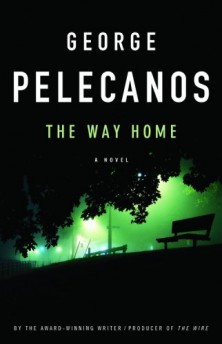 Reviewed:
Reviewed:
The Way Home by George Pelecanos
Little, Brown, 336 pp., $24.99
In the last 17 years, George Pelecanos has published 16 crime novels set in and around Washington, D.C. He was also a producer and writer for The Wire, and wrote the penultimate episodes in all five seasons — in the HBO drama-series format, these are the heavyweights: the deaths of Wallace, Snoop and Stringer; the shooting of Cutty. And in a profile published last year in the Washington Post, Pelecanos admitted he may be getting tired of it. “Sometimes I think The Wire said it all, and I might as well not write any more crime novels. I can feel my energy beginning to dissipate.” Unfortunately, in his latest novel, his readers can feel that, too.
It gives me absolutely no pleasure to write this. I came to writing fiction and mysteries through Pelecanos. I had always wanted to write, but it wasn’t until reading The Sweet Forever, which was set in the Washington, D.C., of the 1980s, where I grew up, that I began to understand the craft of transposing what you saw and knew onto the page.
The Wire would daunt any writer of urban crime fiction, even one who contributed to the show’s success. The television serial format allows a scope, heft and ambition equal to a novel’s (and superior to a single film) while adding a potent visual dimension. Describing Wallace’s murder would be gripping and resonant in print; watching his best friend shoot him as he pleads and they both cry is far more affecting. The series also out-Pelecanosed Pelecanos in its social awareness, and in the respect, tenderness and intelligence with which it depicted characters whom novelists and cop shows alike tend to caricature or ignore. It’s not that The Wire said it all, but it may simply offer more than Pelecanos or any other single novelist can in this particular area of crime fiction — contemporary, urban, race- and class-focused.
Where television, particularly a 60-hour series, provides breadth, scope and immediacy, a novel is a superior vehicle for interiority, but it’s precisely on these grounds that The Way Home falters. The book tells the story of Chris Flynn, a directionless middle-class teenager from Northwest D.C. who lands in juvy after a car crash and a police chase. Unlike most of his jailmates, he is white and has two concerned parents, Thomas and Amanda. He survives the experience. Once released, he and a former jailmate named Ben go to work for Thomas Flynn’s carpet-installation business. While installing a carpet in a vacant home that a realtor has bought to flip, they find $50,000 in a canvas bag, which sets off a chain of events leading to murder, mayhem, reconciliation and so forth.
The abandoned-money trick reads as tired as it sounds, as do the villains and the plot devices that kick in once the novel’s pivotal crime is finally revealed almost halfway in. I have no complaint about that, really; even when Pelecanos’ plots whir, as in The Sweet Forever or (whirrier still) Shame the Devil, they have always been secondary to his characterization and period details. The problem with The Way Home is that Pelecanos’ moralism, which has always lent weight and resonance to his novels, has grown rather heavy and not quite credible, and he has become more detached from his characters, especially his younger ones. Much of this book is given over to paragraph-length diatribes against the juvenile justice system. That such diatribes are needed makes them no less grating in a novel. Neither of the Flynn men has the lived-in authenticity of Pelecanos’ earlier protagonists like Dimitri Karras, Nick Stefanos or Marcus Clay. Their flaws are too neat, their self-reflection too concise and their changes in character too swift and wholesale. You get the sense not of people struggling to do the right thing — which was the trademark and glory of Pelecanos’ earlier work — but of an author telling you through his characters what the right thing is.
There is a word for this sort of work, and it’s not a novel; it’s a fable, or morality tale, and The Way Home seems less a novel about real people than a morality tale about fathers, sons and Doing the Right Thing. Chris and Thomas both experience their own brief moments of revelation, perhaps a couple of pages each, around which their characters and this book turn. And yet, as anyone who has a troubled relationship with a father (or, I suppose but do not know firsthand, son) knows, it doesn’t work like this.
It’s hard to begrudge Pelecanos his uneasiness about his genre, and I’m not even going to try to pretend that I won’t snap up his next one — and the one after that, and after that, and so forth — the first day it’s published. If he feels shackled by the conventions of crime fiction after 16 books in 17 years, that’s understandable. But the shackles of conventional manly-reconciliation fiction, which he seems prepared to try on for size, are no less restrictive.
Jon Fasman is the author of the novels The Geographer’s Library and The Unpossessed City
. He lives in Washington, D.C.
Books mentioned in this review:

